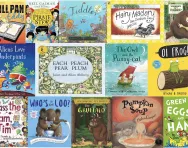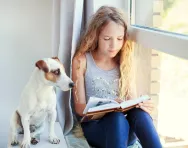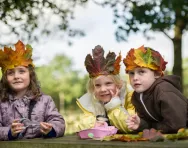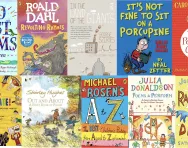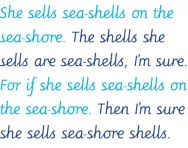Important update from TheSchoolRun
For the past 13 years, TheSchoolRun has been run by a small team of mums working from home, dedicated to providing quality educational resources to primary school parents. Unfortunately, rising supplier costs and falling revenue have made it impossible for us to continue operating, and we’ve had to make the difficult decision to close. The good news: We’ve arranged for another educational provider to take over many of our resources. These will be hosted on a new portal, where the content will be updated and expanded to support your child’s learning.
What this means for subscribers:
- Your subscription is still active, and for now, you can keep using the website as normal — just log in with your usual details to access all our articles and resources*.
- In a few months, all resources will move to the new portal. You’ll continue to have access there until your subscription ends. We’ll send you full details nearer the time.
- As a thank you for your support, we’ll also be sending you 16 primary school eBooks (worth £108.84) to download and keep.
A few changes to be aware of:
- The Learning Journey weekly email has ended, but your child’s plan will still be updated on your dashboard each Monday. Just log in to see the recommended worksheets.
- The 11+ weekly emails have now ended. We sent you all the remaining emails in the series at the end of March — please check your inbox (and spam folder) if you haven’t seen them. You can also follow the full programme here: 11+ Learning Journey.
If you have any questions, please contact us at [email protected]. Thank you for being part of our journey it’s been a privilege to support your family’s learning.
*If you need to reset your password, it will still work as usual. Please check your spam folder if the reset email doesn’t appear in your inbox.
7 classic poems to read with primary-school children
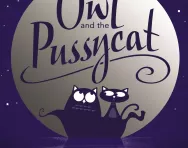
Reception poem: ‘Hurt No Living Thing’ by Christina Rossetti
A short, clear poem with a positive message about not harming anything, even creepy-crawlies! You could use the poem’s simple refrain (‘Nor…’) as a way of talking to your child about repetition.
Hurt No Living Thing
Hurt no living thing:
Ladybird, nor butterfly,
Nor moth with dusty wing,
Nor cricket chirping cheerily,
Nor grasshopper so light of leap,
Nor dancing gnat, nor beetle fat,
Nor harmless worms that creep.
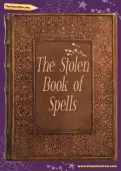
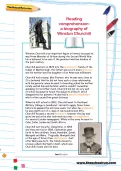
Download brilliant reading comprehension resources
- Reading comprehension workbook – The Stolen Book of Spells
- PLUS 100s of fantastic reading comprehension worksheets, divided by school year
Year 1 poem: ‘Poor Old Lady’ by Anonymous
This is a poem that your child might recognise from the traditional children's song. As well as having a fun story, it offers a good way into discussing how poems are like songs and how they are different – how do the sounds in this poem create their own music?
Poor Old Lady
Poor old lady, she swallowed a fly.
I don't know why she swallowed a fly.
Poor old lady, I think she'll die.
Poor old lady, she swallowed a spider.
It squirmed and wriggled and turned inside her.
She swallowed the spider to catch the fly.
I don't know why she swallowed a fly.
Poor old lady, I think she'll die.
Poor old lady, she swallowed a bird.
How absurd! She swallowed a bird.
She swallowed the bird to catch the spider,
She swallowed the spider to catch the fly,
I don't know why she swallowed a fly.
Poor old lady, I think she'll die.
Poor old lady, she swallowed a cat.
Thank of that! She swallowed a cat.
She swallowed the cat to catch the bird.
She swallowed the bird to catch the spider.
She swallowed the spider to catch the fly,
I don't know why she swallowed a fly.
Poor old lady, I think she'll die.
Poor old lady, she swallowed a dog.
She went the whole hog when she swallowed the dog.
She swallowed the dog to catch the cat,
She swallowed the cat to catch the bird,
She swallowed the bird to catch the spider.
She swallowed the spider to catch the fly,
I don't know why she swallowed a fly.
Poor old lady, I think she'll die.
Poor old lady, she swallowed a cow.
I don't know how she swallowed a cow.
She swallowed the cow to catch the dog,
She swallowed the dog to catch the cat,
She swallowed the cat to catch the bird,
She swallowed the bird to catch the spider,
She swallowed the spider to catch the fly,
I don't know why she swallowed a fly.
Poor old lady, I think she'll die.
Poor old lady, she swallowed a horse.
She died, of course.
Year 2 poem: ‘Pleasant Sounds’ by John Clare
A rich and vivid poem which you can use to get your child to think about different descriptions – how does John Clare bring all the various sounds he describes to life? You could also ask them to describe as many sounds from their daily lives as they can.
Pleasant Sounds
The rustling of leaves under the feet in woods and under hedges;
The crumpling of cat-ice and snow down wood-rides, narrow lanes, and every street causeway;
Rustling through a wood or rather rushing, while the wind halloos in the oak-toop like thunder;
The rustle of birds’ wings startled from their nests or flying unseen into the bushes;
The whizzing of larger birds overhead in a wood, such as crows, puddocks, buzzards;
The trample of robins and woodlarks on the brown leaves, and the patter of squirrels on the green moss;
The fall of an acorn on the ground, the pattering of nuts on the hazel branches as they fall from ripeness;
The flirt of the groundlark’s wing from the stubbles- how sweet such pictures on dewy mornings, when the dew flashes from its brown feathers!
Year 3 poem: ‘The Pied Piper of Hamelin’ by Robert Browning
Again, your child might be familiar with this story, but it’s a good poem to read together and try to work out what is happening. You can talk about how Browning brings the narrative to life by appealing to all the senses, from sound (‘you should have heard the Hamelin people…’) to sight (‘the Mayor looked blue’) and by using rhyme (‘bustling / hustling / clattering / chattering’).
The Pied Piper of Hamelin (an extract)
You should have heard the Hamelin people
Ringing the bells till they rocked the steeple.
Go," cried the Mayor, “and get long poles!
Poke out the nests and block up the holes!
Consult with carpenters and builders
And leave in our town not even a trace
Of the rats!”-- when suddenly, up the face
Of the Piper perked in the market-place,
With a, “First, if you please, my thousand guilders!”
A thousand guilders! The Mayor looked blue;
So did the Corporation too.
For council dinners made rare havoc
With Claret, Moselle, Vin-de-Grave, Hock;
And half the money would replenish
Their cellar’s biggest butt with Rhenish.
To pay this sum to a wandering fellow
With a gypsy coat of red and yellow!
“Beside," quoth the Mayor with a knowing wink,
“Our business was done at the river’s brink;
We saw with our eyes the vermin sink,
And what’s dead can’t come to life, I think.
So, friend, we’re not the folks to shrink
From the duty of giving you something for drink,
And a matter of money to put in your poke;
But as for the guilders, what we spoke
Of them, as you very well know, was in joke.
Beside, our losses have made us thrifty.
A thousand guilders! Come, take fifty!
The Piper’s face fell, and he cried,
“No trifling! I can’t wait! Beside,
I’ve promised to visit by dinnertime
Bagdad, and accept the prime
Of the Head-Cook’s pottage, all he’s rich in,
For having left, in the Caliph’s kitchen,
Of a nest of scorpions no survivor -
With him I proved no bargain-driver,
With you, don’t think I’ll bate a stiver!
And folks who put me in a passion
May find me pipe to another fashion.”
“How?” cried the Mayor, “d’ye think I brook
Being worse treated than a Cook?
Insulted by a lazy ribald
With idle pipe and vesture piebald?
You threaten us, fellow? Do your worst,
Blow your pipe there till you burst!”
Once more he stept into the street
Laid his long pipe of smooth straight cane;
And ere he blew three notes (such sweet
Soft notes as yet musician’s cunning
Of merry crowds justling at pitching and hustling,
Small feet were pattering, wooden shoes clattering,
Little hands clapping, and little tongues chattering,
And, like fowls in a farm-yard when barley is scattering, Out came the children running.
All the little boys and girls,
With rosy cheeks and flaxen curls,
And sparkling eyes and teeth like pearls,
Tripping and skipping, ran merrily after
The wonderful music with shouting and laughter.
Year 4 poem: ‘What Are Heavy?’ By Christina Rossetti
This poem is a bit like a riddle, but it's straightforward enough to discuss together and work out why Christina Rossetti has paired things you can see with your own eyes (like ‘sea-sand’ and ‘the ocean’) with emotions (like ‘sorrow’ and ‘truth’). Primary-school children often write their own question-and-answer poems in class, so your child might look at a poem like this at school.
What Are Heavy?
What are heavy? Sea-sand and sorrow:
What are brief? Today and tomorrow:
What are frail? Spring blossoms and youth:
What are deep? The ocean and truth.
Year 5 poem: ‘The Tyger’ by William Blake
Blake’s poem is great to read aloud as a family (different people can read different verses) and gives plenty of scope for discussion. The descriptions are full of words that make you think of heat (‘burning’, ‘fire’, ‘furnace’). Do they remind your child of how a tiger’s markings look a bit like flames?
The Tyger
Tyger Tyger, burning bright,
In the forests of the night;
What immortal hand or eye,
Could frame thy fearful symmetry?
In what distant deeps or skies.
Burnt the fire of thine eyes?
On what wings dare he aspire?
What the hand, dare seize the fire?
And what shoulder, and what art,
Could twist the sinews of thy heart?
And when thy heart began to beat,
What dread hand? and what dread feet?
What the hammer? what the chain,
In what furnace was thy brain?
What the anvil? what dread grasp,
Dare its deadly terrors clasp!
When the stars threw down their spears
And water'd heaven with their tears:
Did he smile his work to see?
Did he who made the Lamb make thee?
Tyger, Tyger burning bright,
In the forests of the night:
What immortal hand or eye,
Dare frame thy fearful symmetry?
Year 6 poem: ‘The Fish’ by Elizabeth Bishop
This sensuous, descriptive poem should provide a bit more of a challenge for older children. You could focus on the similies and metaphors that Bishop uses (‘his brown skin hung in strips / like ancient wallpaper’, ‘flesh / packed in like feathers’….) and the effect they have as well as discussing the significance of the ending of the poem, the way the narrator lets the fish go again after catching it.
The Fish
I caught a tremendous fish
and held him beside the boat
half out of water, with my hook
fast in a corner of his mouth.
He didn’t fight.
He hadn’t fought at all. He hung a grunting weight,
battered and venerable
and homely. Here and there
his brown skin hung in strips
like ancient wallpaper,
and its pattern of darker brown
was like wallpaper:
shapes like full-blown roses
stained and lost through age.
He was speckled with barnacles,
fine rosettes of lime,
and infested
with tiny white sea-lice,
and underneath two or three
rags of green weed hung down.
While his gills were breathing in
the terrible oxygen
– the frightening gills,
fresh and crisp with blood,
that can cut so badly –
I thought of the coarse white flesh
packed in like feathers,
the big bones and the little bones,
the dramatic reds and blacks
of his shiny entrails,
and the pink swim-bladder
like a big peony.
I looked into his eyes
which were far larger than mine
but shallower, and yellowed,
the irises backed and packed
with tarnished tinfoil
seen through the lenses
of old scratched isinglass.
They shifted a little, but not
to return my stare.
– It was more like the tipping
of an object toward the light.
I admired his sullen face,
the mechanism of his jaw,
and then I saw
that from his lower lip
–if you could call it a lip –
grim, wet, and weaponlike,
hung five old pieces of fish-line,
or four and a wire leader with the swivel still attached,
with all their five big hooks grown firmly in his mouth.
A green line, frayed at the end
where he broke it, two heavier lines,
and a fine black thread
still crimped from the strain and snap
when it broke and he got away.
Like medals with their ribbons
frayed and wavering,
a five-haired beard of wisdom
trailing from his aching jaw.
I stared and stared
and victory filled up the little rented boat,
from the pool of bilge
where oil had spread a rainbow
around the rusted engine
to the bailer rusted orange,
the sun-cracked thwarts,
the oarlocks on their strings,
the gunnels – until everything
was rainbow, rainbow, rainbow!
And I let the fish go.
The Owl and the Pussycat: An Anthology of Poems That Every Child Should Read is edited by Helen Mort and published by Buster Books.
Free recordings of classic poems for children
We love the Storynory recodings of classic children's poems, available to listen to and download for free. Enjoy!

